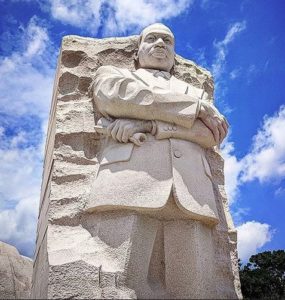I have known a number of people who were consumed with becoming a leader, but in my observation, few such people make good leaders. I think I know why.
They are not usually interested in being leaders; they are interested in occupying a position of leadership. These are two different things.
Because the goal is to occupy a position, they climb over their people and claw their way to the top. They see others as pawns to be used for their own purposes. But if the essence of good leadership is taking care of those in your charge, these people are identifying themselves as anti-leaders.
True leaders tend to take a different approach. There is a high road to leadership. It involves service and sacrifice. I was struck by this thought as I was reading about Martin Luther King Jr. this past week

King
We all know King as the icon of the civil rights movement, but we tend to focus on the end and not the beginning of his story. King first came to prominence during the Montgomery bus boycott after the arrest of Rosa Parks. He had recently completed his doctorate and he was pastoring the Dexter Avenue Baptist Church. He had earlier declined the presidency of the local NAACP because he had a newborn and heavy responsibilities as a pastor.
When black leaders formed the Montgomery Improvement Association to deal with the bus boycott, King suggested Rufus Lewis. Ultimately, King was nominated and elected. He didn’t want the job, but he agreed to serve. The role thrust him into the national spotlight as the boycott lasted for 385 days.
A year later, the Southern Christian Leadership Center (SCLC) was formed and King was elected its first president. Over time, he came to embody his cause (as nearly all great leaders do) and he paid dearly for his commitment. He would be jailed, his house was bombed, he was routinely threatened, surveilled, and eventually, he was assassinated. We honor him with a national holiday because of his service and sacrifice.
What was true of King was true of other great leaders too.
Mandela
Mandela was elected to the presidency of the African National Congress Youth League in his absence. You heard that right—elected in his absence. He wasn’t there to run for the position. He didn’t need to lobby for the position. He was the obvious candidate because he kept showing up whenever something needed to be done. Protest. Lawsuit. March. There was Nelson Mandela leading (without a tile or office). So, when an office was available, he was the obvious choice.
In time, Mandela moved from protest and legal action to sabotage, and he paid dearly for his actions. He narrowly avoided the death penalty and he spent 1964-1982 in hard labor in prison on Robben Island. He was transferred to Pollsmoor prison and then Victor Verster prison until his release in 1990. Upon his release, he went back to work fighting against apartheid. He was elected President of South Africa in 1994 by a wide margin. We remember Mandela as the president of South Africa as we should, but we forget that he was swept into power for his service and sacrifice.
Washington
After the American Revolution, George Washington was the only man with the stature to chair the Constitutional convention in 1787. When the new government was formed, he was elected to the presidency in 1789. He was the only president to be elected unanimously by the electoral college. Washington didn’t scheme for office. He didn’t even want the office. He wanted to retire to his neglected estate at Mount Vernon, but he chose service over self again and again and again.
Conclusion
The lesson here is simple. Service and sacrifice lead to leadership. They prove the leader’s value to those that they would lead. Those who seek the office of leadership first short-circuit the system and history demonstrates that they are far more likely to act in ways contrary to the interests of those that they lead.
You don’t have to scheme for a leadership position. If you want to lead, serve. This is not a new lesson; it is very old. It is just not often practiced:
Jesus called them together and said, “You know that the rulers of the Gentiles lord it over them, and their high officials exercise authority over them. Not so with you. Instead, whoever wants to become great among you must be your servant, and whoever wants to be first must be your slave— just as the Son of Man did not come to be served, but to serve, and to give his life as a ransom for many.” (Matthew 20: 25-28, New International Version).
What About You?
How would you rate your service? If you aspire to lead, are you politicking for office or are you focused on serving?
___________

Dr. Darin Gerdes is a tenured Professor of Management in the College of Business at Charleston Southern University.
All ideas expressed on www.daringerdes.com are his own.
This post was originally created for Great Business Networking (GBN), a networking organization for business professionals where Dr. Gerdes is the Director of Education.
___________
